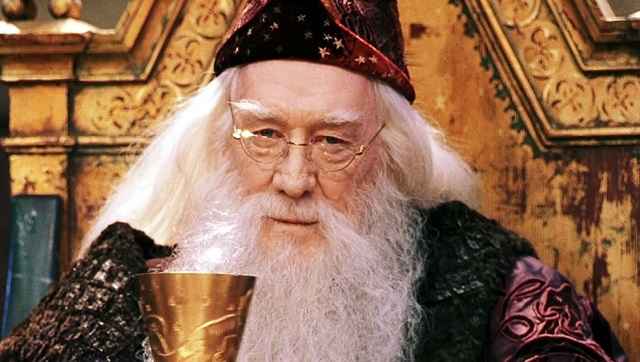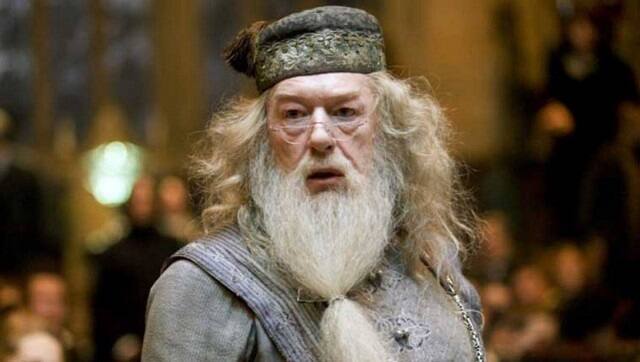“You are wondering why I brought you here tonight,” Albus Dumbledore tells Harry Potter early in the sixth movie, Half Blood Prince. “Actually sir, after all these years, I just sort of go with it,” Potter replies. There is something dark and steely in Michael Gambon’s Dumbledore. The one who warns Hermoine that the consequences for wizards who meddle with time are “too ghastly to discuss,” instructing her rather than acting to save a life as she implored him to do. He is also angrier. Gambon’s Dumbledore charges into a room grabbing Harry by the collar, desperately asking him if he might have put his own name into the goblet of fire, a scene that went down in meme history. As for the people he dislikes, the second Dumbeldore relishes any opportunity to mock. He makes a grand escape before the Ministry people. “You seem to be labouring under the delusion that I will – what is the phrase – come quietly?” He tells a fuming Dolores Umbridge and Cornelius Fudge in his office before leaving in “style” – Kingsely Shacklebolt’s admission. This sort of showing off is rarer in Richard Harris’ Dumbledore, that fans have argued is closest to the book. A friendly yet distant authority, he is as unphased with the import of being the greatest wizard of all time as he is eating an earwax flavoured Bertie Bott bean. He is the Dumbeldore that Rubius Hagrid trusts with his life. One has got to be even-tempered in a school full of babbling ghosts and monstrous creatures, where staircases will lead to different destinations based on the day of the week, and tournaments may take the life of 17-year-olds. [caption id=“attachment_10572431” align=“alignnone” width=“640”]  Richard Harris as Albus Dumbledore[/caption] This custodian of Hogwarts School of Witchcraft and Wizardry is not without humour, though. He loves the drama of misdirection, giving last-minute points to Gryffindor after declaring Slytherin’s first place, snatching the House cup away from them. In Chamber of Secrets, he lists Harry and Ron Weasley’s misdemeanours and rule violations, as if to make a case for their expulsion. Incorrigibly, after a heavy pause, he gives them special awards instead.
Jude Law’s Dumbledore is a return to the warm-hearted, self-effacing man but retaining some intensity from Gamobn’s version.
He telegraphs niceness, without Harris’ aloofness. He is now Albus, the sensitive soul, reminiscing about his great love. His magic gloves gesture come hither, his eyes beg, and when the blood pact breaks, he still lets Gellert go. Maybe, this is the same man who falters, tempted to wear the resurrection stone, weak to the manipulations of a horcrux. But the new movie also lays bare the confusing nature of his help. It is probably the first time we are seeing Dumbledore preemptively giving the reasoning behind his orders, unlike say the time he iced Harry out to protect The Order of the Phoenix. Grindelwald (Mads Mikkelsen) is a Seer, and hence Newt Scamander (Eddie Redmayne) conveys to the rest of the team Dumbledore’s message, “Our best hope is to confuse him.” It is a hack so if viewers judge the action as confusing, the script has a convenient justification – that was the point. Dumbeldore can be as autocratic as the villains of this fantasy saga, the way he judges what is fit for others without taking anyone else into confidence. We are urged to look away because Dumbledore is the picture of relief. His half moon spectacles, white beard, and travelling coat are comforting. We are reminded by Hermione telling Harry that as long as Dumbeldore is at Hogwarts, no one can touch Harry. “As long as Dumbledore is here, you are safe." When he dies, it almost feels like the death of Christ. Even in The Secrets of Dumbledore, the Qilian is supposed to legitimise Grindelwald, but legitimises Dumbeldore. It is not a set up for the voters of the Wizarding world, but for us to continue to put our faith in the professor. If he is good enough for an ancient magical creature, he is supposed to be good enough for us. Dumbledore’s lasting advice to Harry and to us is that love conquers all. Yet in his arc with Grindelwald, there is an attempt to caution about blind love. No, we are not sufficiently cautioned. Our endless love for this mentor figure makes us less objective, and Dumbeldore more egotistical. The words, “You have to trust me, even when every instinct is telling you not to,” are uttered without big reveals and high stakes in the Fanatstic Beasts movie. What really was his plan to stop the election fraud? He abandons Jacob to go stand in the middle of the crowd amassed to watch the walk of Qilian. The team could have used his help. The risk of the briefcase that contained not just the Qilian, but all of Scamander’s rescues – on which the new franchise hinges – being destroyed is never considered, never addressed. The New Yorker has hinted at JK Rowling’s inclination for flashy endings, a serious fault in the last two Harry Potter books. With a penchant for lengthy dénouements and Scooby Doo unmasking, her surprises are sometimes maybe “too surprising.” For instance, we are supposed to believe Sirius Black, the serial killer, is a good guy, but Ron’s harmless fat rat is a traitorous villain. In Rowling’s own words, “(Dumbledore) seems to be so benign for six books, he’s quite a Machiavellian figure, really. He’s been pulling a lot of strings. Harry has been his puppet…When Snape says to Dumbledore (toward the end of The Deathly Hallows), ‘We’ve been protecting (Harry) so he could die at the right moment’ — I don’t think in book one, you would have ever envisioned a moment where your sympathy would be with Snape rather than Dumbledore." [caption id=“attachment_10572441” align=“alignnone” width=“640”]  Michael Gambon as Albus Dumbledore[/caption] Dumbledore’s jagged edges can uplift the children’s book genre as children are reminded of goodness without an attached sentimentality. An important tool to reconcile with grief and unfairness of the world for those who have to encounter it too soon. Significantly, Dumbeldore owns up to his mistakes with Ariana and Grindelwald. Learning from his mistakes also makes him a wiser man. Right to his death, his mistakes serve as an engine for self-awareness. This is why Dumbledore’s lack of communication feels like an oversight. When he has a deeper insight into how the universe functions, it is also incredibly frustrating to not have it revealed. But moving the queer coding from subtext to text feels like a step in the right direction. Fantastic Beasts and the Secrets of Dumbledore is playing in cinemas. Eisha Nair is an independent writer-illustrator based in Mumbai. She has written on history, art, culture, education, and film for various publications. When not pursuing call to cultural critique, she is busy drawing comics. Read all the Latest News , Trending News , Cricket News , Bollywood News , India News and Entertainment News here. Follow us on Facebook, Twitter and Instagram.


)
)
)
)
)
)
)
)
)



